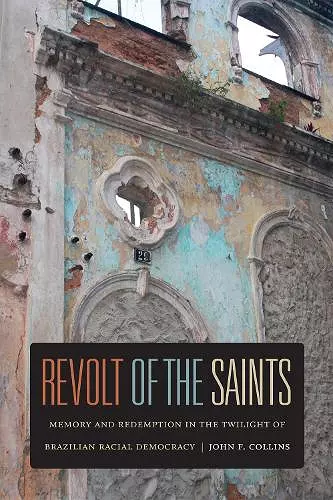Revolt of the Saints
Memory and Redemption in the Twilight of Brazilian Racial Democracy
Format:Paperback
Publisher:Duke University Press
Published:8th Jun '15
Currently unavailable, and unfortunately no date known when it will be back
This paperback is available in another edition too:
- Hardback£99.00(9780822353065)

In 1985 the Pelourinho neighborhood in Salvador, Brazil was designated as a UNESCO World Heritage Site. Over the next decades, over 4,000 residents who failed to meet the state's definition of "proper Afro-Brazilianness" were expelled to make way for hotels, boutiques, NGOs, and other attractions. In Revolt of the Saints, John F. Collins explores the contested removal of the inhabitants of Brazil’s first capital and best-known site for Afro-Brazilian history, arguing that the neighborhood’s most recent reconstruction, begun in 1992 and supposedly intended to celebrate the Pelourinho's working-class citizens and their culture, revolves around gendered and racialized forms of making Brazil modern. He situates this focus on national origins and the commodification of residents' most intimate practices within a longer history of government and elite attempts to "improve" the citizenry’s racial stock even as these efforts take new form today. In this novel analysis of the overlaps of race, space, and history, Collins thus draws on state-citizen negotiations of everyday life to detail how residents’ responses to the attempt to market Afro-Brazilian culture and reimagine the nation’s foundations both illuminate and contribute to recent shifts in Brazil’s racial politics.
"The rich and multifaceted analysis Collins presents in this book is sure to be of interest to a wide range of readers. Its highly original and provocative analysis of heritage politics and memory, as well as racial politics in Brazil, makes it a must-read for scholars in these fields. In addition, the book has much to offer to a readership concerned with urban poverty and government efforts to address it, tourism, and the deep entanglements of social scientific scholarship with local politics of culture, race, history, and morality. Finally, the manner in which Collins translates sensitive ethnographic research and description into thought-provoking theoretical insight speaks directly to recent anthropological discussions on ethnographic theorization." -- Elina I. Hartikainen * Journal of Latin American and Caribbean Anthropology *
"...remarkably iconoclastic analysis of race, space, and history.... ethnography that invades the minds and stirs the guts of all those involved in its contents and consumption." -- Nubia Bento Rodrigues * AAG Review of Books *
"This is indeed a gringo who knows his Brazil; the analysis is laced with poetry, with the plots of classic novels, with smells, odd recollections, postcards, music, maps, numerous black-and-white photographs, and with emotion—including a millennial version of the sadness of the tropics..." -- Robin E. Sheriff * Journal of Anthropological Research *
"There can be little doubt... that this important book will long remain a touchstone for future research on the perils of top-down management of a vulnerable community’s cultural heritage." -- Michael F. Brown * International Journal of Cultural Property *
"[An] extraordinarily detailed and theoretically imaginative exploration of how elite and nonelite ideas of Afro-Bahian history and identity coincide, collide, and mutually refract in the decades both before and after the UNESCO declaration." -- John Burdick * American Ethnologist *
"[Revolt of the Saints] succeeds in disturbing conventional platitudes about race and history in the construction of a Brazilian national identity. It is theoretically subtle, methodologically extraordinary, and adds a healthy dose of cynicism to the vast and often starry-eyed ethnography of black people in Bahia." -- Brian Brazeal * Anthropological Quarterly *
"Collins’s book is a Caribbean pepperpot stew, an ongoing accretion of ingredients simmered for long periods. It is mature, flavourful, surprising and rewarding. Its constant reflexive re-framings and maze-like progressions fascinate, and occasionally produce an Alice-through-the-looking-glass sense of (not unpleasurable) disorientation." -- Peter Wade * Journal of Latin American Studies *
"With this book John F. Collins explores the possibilities of ethnography in a very elegant and sensorial way,
without neglecting to offer a novel and very well-illustrated approach to the contemporary politics of patrimony and how it ties with racial politics, turning race from quality into a historical and historicised property." -- Susana Boletas * Social Anthropology *
"[Collins's] retelling of the contemporary reconstruction of the Pelourinho is imaginative and unconventional. . . . Collins enriches our understanding of contemporary shifts in Bahian racial politics." -- Andrew Britt * H-LatAm, H-Net Reviews *
ISBN: 9780822353201
Dimensions: unknown
Weight: 771g
480 pages